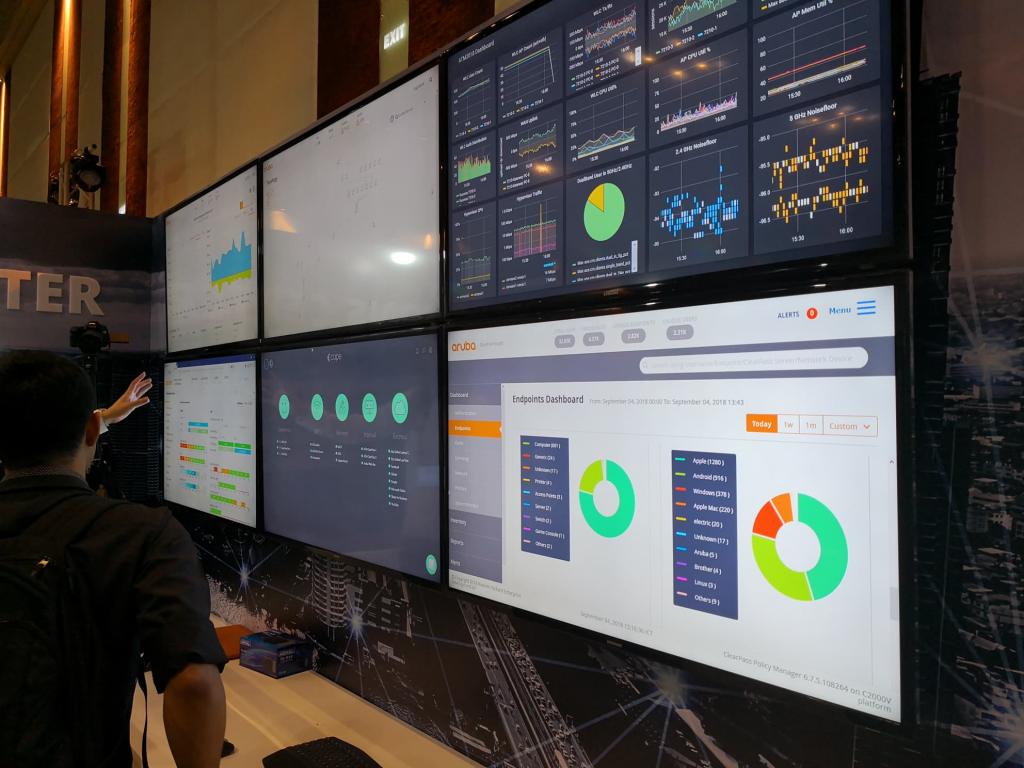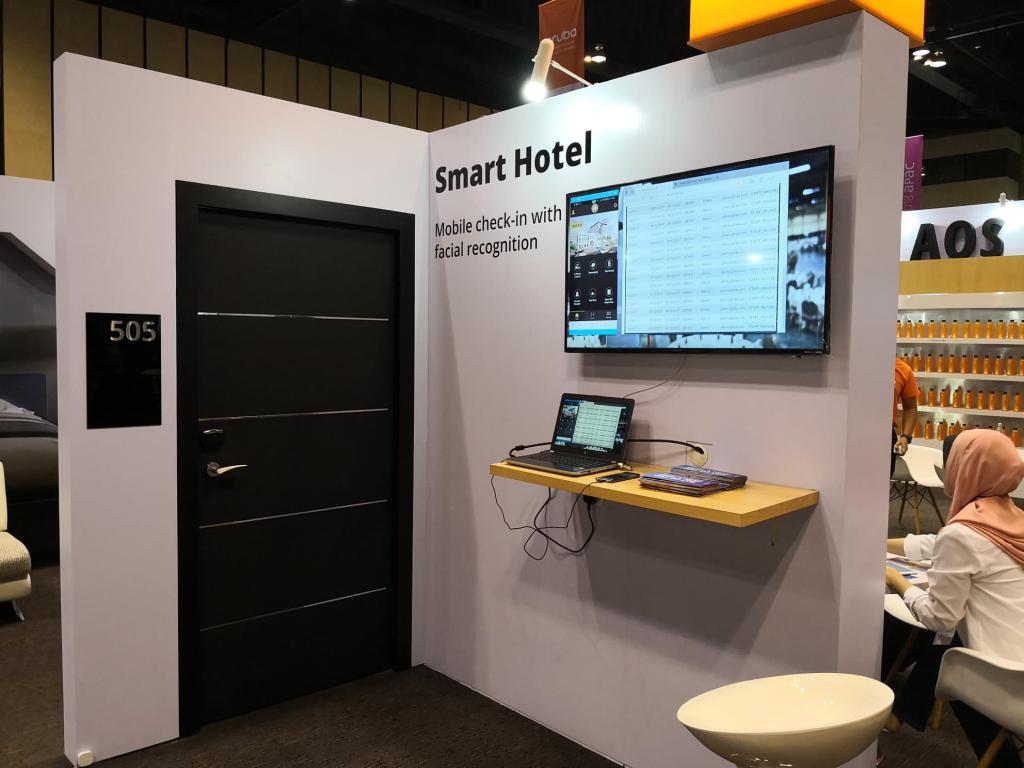
รายงานการศึกษาระดับสากลฉบับนี้ชี้ให้เห็นผลดีอื่น ๆ ที่เกิดขึ้นมากกว่าเรื่องผลการทำงานที่เพิ่มขึ้น และเตือนองค์กรให้เตรียมพร้อมเรื่องการรักษาความปลอดภัยของข้อมูลมากให้ยิ่งขึ้น
กรุงเทพมหานคร, วันที่ 4 กันยายน พ.ศ.2561–พนักงานทั้งหลายที่ทำงานอยู่ในสำนักงานที่ทันสมัยเพียบพร้อมไปด้วยเทคโนโลยีดิจิทัล (Digital Workplace) ไม่เพียงแต่จะมีผลการทำงานเพิ่มขึ้น แต่ยังมีแรงจูงใจในการทำงานมากขึ้น มีความพึงพอใจในการทำงานสูงขึ้นและมีรายงานที่ชี้ให้เห็นสภาพการดำเนินชีวิตโดยรวมที่ดีขึ้น ตามผลการศึกษาระดับสากลซึ่งจัดทำโดยอรูบ้า (Aruba) บริษัทหนึ่งในเครือบริษัทฮิวเลตต์แพคการ์ดเอ็นเตอร์ไพรส์
ในรายงานผลการศึกษาเรื่อง ,นักปฏิวัติดิจิทัลช่วยปลดล็อคศักยภาพของสำนักงานยุคดิจิทัล (Digital Revolutionaries Unlock the Potential of the Digital Workplace), ชี้ให้เห็นผลดีทั้งในด้านธุรกิจและการดำเนินชีวิตของพนักงานในที่ทำงานที่ใช้ดิจิทัลเป็นตัวขับดันการทำงาน (Digital-driven Workplace) มากขึ้น และการที่บริษัทที่ก้าวหน้าทางด้านเทคโนโลยีน้อยกว่ามีโอกาสเสี่ยงที่จะถูกแซงหน้าโดยคู่แข่งที่เหนือกว่า ไม่สามารถดึงดูดพนักงานเก่ง ๆ ชั้นแนวหน้ามาทำงานกับตนได้ และยังเตือนให้บริษัททั้งหลายต้องเพิ่มความสนใจมากขึ้นแก่พนักงานที่มีวิถีชีวิตผูกพันกับดิจิทัล (Digital-savvy Employee) เหล่านี้ว่าอาจจะเป็นผู้ที่เพิ่มความเสี่ยงในด้านความปลอดภัยของข้อมูลและข่าวสารให้แก่องค์กรได้
เนื้อหาหลักและการค้นพบที่สำคัญ
การศึกษาพนักงานทั่วโลกจำนวน 7,000 คนใน 15 ประเทศของหลากหลายองค์กรพบว่ามีความแตกต่างอย่างชัดเจนในเรื่องประสิทธิภาพการทำงานและความรู้สึกผูกพันของพนักงานกับองค์กรระหว่างในองค์กรที่มีสำนักงานยุคดิจิทัลกับองค์กรที่นำเทคโนโลยีดิจิทัลมาใช้ในระดับที่น้อยกว่า เนื้อหาสำคัญที่พบได้แก่
“ไม่ว่าจะเป็นอุตสาหกรรมไหน เราพบว่ามีแนวโน้มที่จะมุ่งสร้างสถานที่ทำงานที่ใส่ใจในความเป็นมนุษย์ (Human-centric Places) เพื่อตอบสนองให้ทันความคาดหวังของพนักงานที่เปลี่ยนแปลงไปอย่างรวดเร็วและหาหนทางทำให้พนักงานมีความต้องการที่จะทำงานด้วยกับตน” กล่าวโดย Joseph White ผู้อำนวยการฝ่ายพัฒนากลยุทธ์ออกแบบและจัดการสำหรับสถานที่ทำงาน ของ Herman Miller “โดยมีการรวมเอาเทคโนโลยีที่ก้าวหน้ามาใช้–รวมถึงเรื่องการตกแต่งเฟอร์นิเจอร์ภายในสำนักงาน–รวมทั้งวิทยาศาสตร์ทางด้านการเรียนรู้ (Cognitive Sciences) มาช่วยให้พนักงานคุ้นเคยกับการทำงานแบบใหม่ นี้ไม่ได้หมายถึงแค่เพียงให้ประสบการณ์ที่เป็นพิเศษและเป็นส่วนตัวสำหรับพนักงานแต่ละคนเท่านั้น แต่ยังรวมถึงโอกาสขององค์กรที่จะดึงดูดและรักษาพนักงานที่มีความสามารถที่ดีที่สุดไว้ด้วย”
“ธรรมชาติของคำว่า “สำนักงาน” กำลังถูกเปลี่ยนแปลงไปแล้ว เพราะองค์กรต่าง ๆ เริ่มตระหนักว่าสถานที่ทำงานที่มีประสิทธิภาพต้องเน้นประสบการณ์ที่ดีในการทำงานเป็นศูนย์กลาง (Experience-centric) และจะต้องสามารถทำให้เข้ากันได้ระหว่างสไตล์การทำงานที่หลากหลายและบุคลิกความชอบของแต่ละบุคคล” กล่าวโดย Francisco Acoba กรรมการผู้จัดการของ Deloitte Strategy & Operations “แนวโน้มนี้กำลังนำไปสู่กระบวนการทำงานแบบใหม่ในที่ซึ่งโซลูชั่นทางด้าน IT การก่อสร้างอาคารและการตกแต่งเฟอร์นิเจอร์จะต้องมีปฏิสัมพันธ์กันอย่างกลมกลืนสร้างสรรค์กับมนุษย์ เพื่อสร้างสถานที่ทำงานขึ้น (Space) ไม่ว่าสถานการณ์เฉพาะขององค์กรคุณจะเป็นอย่างไร เมื่อสถานที่ทำงานกลายเป็นสถานที่ทำให้พนักงานมีส่วนร่วมอย่างกระตือรือร้นในการทำงานในสถานที่นั้นย่อมส่งผลกระทบในเชิงบวกต่อผลลัพธ์ทางธุรกิจแน่นอนยิ่งกว่านั้นพนักงานที่รู้สึกสะดวกสบายใจในที่ทำงานยังสามารถทำภาระกิจของตนให้สำเร็จลุล่วงลงได้ ส่วนผู้ที่ไม่รู้สึกแบบนี้ในที่ทำงานของตนก็มักจะต้องย้ายงานไปหาที่ทำงานใหม่ที่มีบรรยากาศน่าเชิญชวนให้ทำงานมากกว่า”

ความเสี่ยงที่เพิ่มขึ้น
จากผลการศึกษาพบว่าพนักงานทั้งหลายรู้สึกกระตือรือร้นกับเทคโนโลยีใหม่ ๆ และต้องการให้บริษัทของตนจัดหามาให้มากขึ้นด้วย ผู้ถูกสัมภาษณ์เกือบทั้งหมดทั่วทั้งภูมิภาคเอเชียแปซิฟิก (98%) เห็นว่าสถานที่ทำงานของตนควรจะถูกปรับปรุงให้ดีขึ้นด้วยการใช้เทคโนโลยีให้มากขึ้น ขณะที่มีถึง 70% เห็นว่าองค์กรของตนจะล้าหลังกว่าคู่แข่งถ้ายังไม่มีการนำเทคโนโลยีใหม่ ๆ เข้ามาใช้ และมีถึง 67% เชื่อว่าสำนักงานแบบดั้งเดิมจะกลายเป็นเรื่องล้าสมัย เพราะเทคโนโลยีก้าวล้ำหน้าขึ้นไปเรื่อย ๆ
ขณะที่ผลดีที่ได้จากการมีสำนักงานยุคดิจิทัลมีหลากหลายประการ แต่จากการศึกษายังชี้ให้เห็นภัยคุกคามทางไซเบอร์ (Cybersecurity) เป็นความท้าทายที่องค์กรต้องพยายามแก้ไขป้องกันไว้ด้วย
หนทางสู่อนาคต
การค้นพบเหล่านี้ชี้ให้เห็นว่าบริษัทต่าง ๆ ควรที่จะรีบนำผลดีทางเทคโนโลยีของการมีสำนักงานยุคดิจิทัลมาปรับใช้งานเสียทีในขณะเดียวกันก็มองหาหนทางลดความเสี่ยงต่อความปลอดภัยลงให้เหลือน้อยที่สุดด้วย อรูบ้ามีข้อเสนอแนะองค์กรต่าง ๆ ควรจะดำเนินการดังต่อไปนี้ :
“สถานที่ทำงานกำลังถูกทำให้กลายเป็นการบริโภคประเภทหนึ่ง เพราะพนักงานทุกคนล้วนเป็นผู้บริโภคและเขานำความคาดหวังแบบผู้บริโภคเหล่านี้เข้ามาทำงานกับเราด้วย” กล่าวโดย Janice Le หัวหน้านักการตลาดของอรูบ้า (Aruba) “สำนักงานกำลังถูกทำให้ฉลาดมากขึ้น เพื่อที่พนักงานเองจะได้ทำงานได้อย่างชาญฉลาดยิ่งขึ้นด้วย”
แนวความคิดใหม่ ๆ กำลังเกิดขึ้นโดยเป็นการรวมเทคโนโลยีอาคารอัจฉริยะ (Smart Building Technologies) เข้ากับสำนักงานยุคดิจิทัลกลายเป็นสำนักงานยุคดิจิทัลอัจฉริยะ (Smart Digital Workplace) เป็นสถานที่ซึ่งมีการออกแบบมุ่งรองรับความสดวกสบายของมนุษย์ ให้ทำงานร่วมกับอุปกรณ์ IoT และระบบอัตโนมัติทั้งหลาย สำนักงานยุคดิจิทัลอัจฉริยะจะให้ประสบการณ์ที่เป็นส่วนบุคคลอย่างเช่นการเชื่อมต่อกับอุปกรณ์เฟอร์นิเจอร์และการปรับแสงสว่างอย่างชาญฉลาดตามความพึงพอใจของผู้ใช้ อาคารจะมุ่งอนุรักษณ์พลังงานมากขึ้น โดยมีการปรับเปลี่ยนการใช้พลังงานอย่างเป็นพลวัตรโดยมุ่งเน้นประโยชน์การใช้งานสูงสุดและคำนึงถึงรูปแบบการใช้งานของผู้ใช้แต่ละคน แนวทางใหม่นี้ไม่เพียงแต่จะเพิ่มผลงานของพนักงานแต่ยังเพิ่มประสิทธิภาพโดยมุ่งมองมนุษย์เป็นศูนย์กลางอีกด้วย
Le สรุปว่า “การศึกษาระดับสากลครั้งนี้ชี้ให้เห็นว่า การเลือกได้ (Choice) ความเป็นส่วนตัว (Personalization) ความสะดวกในการใช้งาน (Ease) และระบบอัตโนมัติ (Automation) จะให้ผลดีทั้งระดับในการดำเนินงานและผลประกอบการขององค์กรที่ได้มีการปรับเปลี่ยนที่ทำงานให้รองรับแนวโน้มอนาคตนี้ ที่ทำงานของเราเองเป็นเสมือนห้องทดลองมีชีวิตของสำนักงานยุคดิจิทัลอัจฉริยะและเราเห็นผลลัพธ์จากการที่เราสามารถหาพนักงานใหม่ ๆ ที่ชาญฉลาดมาบรรจุเข้าทำงานกับเราได้เร็วขึ้นและพนักงานเก่าชั้นยอดล้วนยอมรับตำแหน่งงานที่สูงขึ้นในองค์กรโดยไม่ลาออกไปอยู่ที่อื่น เป็นผลดีที่จับต้องได้และมากกว่าในเรื่องของผลสำเร็จในการทำงานที่เพิ่มขึ้นอีกด้วย”
อ่านรายงานเต็มฉบับได้ที่ https://www.arubanetworks.com/worksmart
The Right Technologies Unlock the Potential of the Digital Workplace
Global Study Reveals Benefits Transcend Productivity, but Organizations Must Prepare for Data Security Risks
Bangkok, thailand — September 4th, 2018—Employees who work in digital workplaces are not only more productive but also more motivated, have higher job satisfaction, and report an overall better sense of well-being, according to a new global study from Aruba, a Hewlett Packard Enterprise company.
The study, Digital Revolutionaries Unlock the Potential of the Digital Workplace, reveals both the business and human benefits of more digitally-driven workplaces, and how companies that are less technologically advanced are at risk of falling behind the competition and not attracting top talent. It also notes that companies must be vigilant as more digital-savvy employees are taking greater risks with data and information security.
Key Themes and Findings
The study of 7,000 employees across 15 countries revealed a clear chasm in employee performance and sentiment between more advanced digital workplaces and those that employ digital technology to a lesser degree. A number of key themes emerged:
“No matter the industry, we’re seeing a move toward human-centric places as enterprises strive to meet rapidly changing expectations of how people want to work,” Joseph White, Director of Workplace Strategy, Design and Management, Herman Miller. “This depends upon combining advances in technology – which includes furnishings – with the cognitive sciences to help people engage with work in new ways. This will not only mean singular, premium experiences for individuals, but also the opportunity for organizations to attract and retain the best talent.”
“The very nature of the term “workplace” is being transformed, as companies begin to realise that effective space is experience-centric, and must accommodate work styles spanning generations and personality types,” said Francisco Acoba, Managing Director for Deloitte Strategy & Operations. “This ushers in new processes where IT solutions, building systems and furnishings interact harmoniously with humans to create such spaces. Regardless of your enterprise’s specific situation, when spaces become active participants in the user experience it benefits the bottom line. After all, workers who feel comfortable in a space get their tasks done. Those who don’t will eventually move on to a more inviting option.”
Emerging Risks
The study also found that employees are enthusiastic about new technology and have a desire for their employers to provide more. Throughout Asia Pacific, almost all respondents (98%) thought their workplace would be improved through greater use of technology, while 70% said their company will fall behind the competition if new technology isn’t implemented. The same portion (67%) believe the traditional office will become obsolete due to advances in technology.
While the benefits of digital workplaces are wide-ranging, the study also revealed that cybersecurity is a challenge for employers.
The Road Forward
These findings indicate that companies must adapt to leverage the benefits of new digital workplace technology while simultaneously minimizing security risks. Aruba recommends that organizations take the following actions:
“The consumerization of the workplace is a very real movement. Employees are consumers and we bring consumer expectations with us to work,” said Janice Le, Chief Marketer for Aruba, a Hewlett Packard Enterprise company. "The workplace is getting smarter and therefore, employees are working smarter.”
A new paradigm has started to emerge where smart building technologies are intersecting with the digital workplace to form the Smart Digital Workplace. This is where human-centered design meets IoT and building automation. The Smart Digital Workplace can enable personalized experiences such as connected furniture and smart lighting that adapts to the user. Buildings can go greener by dynamically optimizing energy utilization based on employee patterns. These new use cases not only foster employee productivity but also improve efficiency while putting people at the center.
Le concluded, “This global study indicates that choice, personalization, ease and automation are improving the top line and the bottom line for organizations who are defining the future of work. Our own place of work is a living lab for the Smart Digital Workplace and we are seeing results such as faster hiring and higher offer acceptances. The benefits are tangible and go beyond productivity.”
To Read the Full report, visit: https://www.arubanetworks.com/worksmart
Research Methodology
A total of 7,000 employees were interviewed in April and May 2018. The respondents were from organizations of all sizes, across both public and private sectors, with a focus on the industrial, government, retail, healthcare, education, finance, and IT/ technology/ telecommunications sectors. Interviews were conducted both online and via telephone using a rigorous multi-level screening process to ensure that only suitable candidates were given the opportunity to participate. Respondents were interviewed in the United Kingdom, Germany, France, the Netherlands, Spain, United Arab Emirates, the United States, Singapore, Japan, Australia, India, Brazil, Mexico, China and South Korea.
About Aruba, a Hewlett Packard Enterprise Company
Aruba, a Hewlett Packard Enterprise company, is a leading provider of next-generation networking solutions for enterprises of all sizes worldwide. The company delivers IT solutions that empower organizations to serve the latest generation of mobile-savvy users who rely on cloud-based business apps for every aspect of their work and personal lives.
To learn more, visit Aruba at http://www.arubanetworks.com. For real-time news updates follow Aruba on Twitter and Facebook, and for the latest technical discussions on mobility and Aruba products visit Airheads Social at http://community.arubanetworks.com/